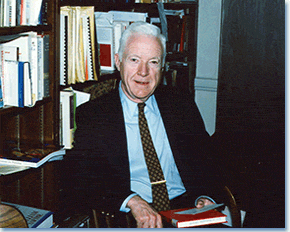
Thomas J. Pressly. Photo courtesy of BlackPast.org
Tom Pressly, an emeritus professor of history in the University of Washington, died on April 3, 2012. Born January 18, 1919, he was raised in Tennessee and educated in the public schools and Harvard University. After receiving bachelor’s and master’s degrees and well before Pearl Harbor, he was drafted into the Army. He became a commissioned officer and served in Panama for nearly a year before returning to the States for training as a navigator. Following a year as an instructor, he was sent to Italy where he navigated combat missions in B-24s during the last months of the European War. Now a captain, he left the Army in November 1945.
Following a brief return to graduate study, Pressly embarked on an academic career that started at Princeton and continued, beginning in the fall of 1949, at the University of Washington. In 1954, Princeton University Press published his first book, Americans Interpret Their Civil War. It was widely reviewed and greatly admired. During these years of his early career, he received fellowships from the Ford Foundation and the Center for Advanced Study of the Behavioral Sciences and started a second book, a study of the idea of the right of revolution. Promoted to full professor in 1960, he published two years later an article on his new topic in the American Historical Review.
Tom never finished the book; it was never his top priority. Instead, by the 1960s, he dedicated himself to teaching. Among his most devoted students were aspiring history teachers. He had a strong interest in these students and always continued to support them after graduation. Key to his wide popularity was his creative approach, dubbed “the Pressly Method” by his colleagues. His methods testified to his confidence in students, for he saw them as entirely capable of reading the primary sources and writing effectively about what they found. In 1974, the UW Alumni Association recognized him as an “Outstanding Teacher.”
Pressly’s reputation as a professor with a strong interest in teaching spread beyond his campus. In 1965 and 1966, he participated in National Defense Education Act Summer Institutes for High School History Teachers, and later in the Sixties, he served on the American Historical Association’s Committee on Teaching and co-authored a booklet for the association on “The Preparation of Secondary School History Teachers.” He also served from the late 1970s to the mid-1990s on the National Advisory Board of the Society for History Education, and in 1989, he contributed an article to the Organization of American Historians’ Magazine of History.
In his home base, Tom was a great colleague: helpful, a wise participant in decision making, and notably welcoming to newcomers. In addition, he established two funds in the department, one recognizing high school history teachers, the other offering financial assistance to new history faculty members under pressure to both teach and publish.
After retiring from teaching in 1988, Pressly remained active. He explored the possibility of turning out an updated version of his still-admired Civil War book and completed two other books. One of these, Voices from the House Divided: the United States Civil War as Personal Experience, was a reader that gave students the primary sources he so strongly wanted them to read and use. In addition, he played tennis and jogged, visited often with friends, and spent ample time with members of his family. He and his wife Cameron had met and married during World War II, had two children, and were together for more than 60 years.
Richard S. Kirkendall
University of Washington